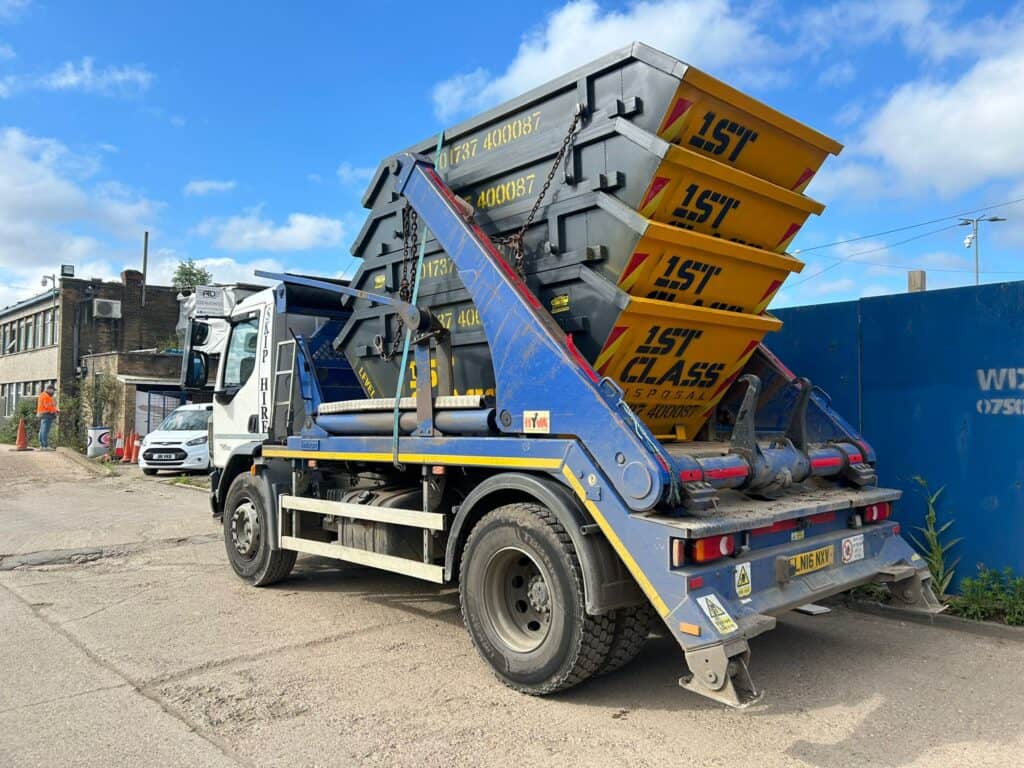It’s imperative to choose the right time of year for your skip hire needs, as this can influence availability, cost, and your overall experience. Booking during off-peak seasons can save you money and ensure you secure the size you require. You may also want to consider seasonal considerations, such as winter weather, which could impact your project. For detailed insights, check our guide on Skip Hire in Winter: A Comprehensive Guide.

Understanding Skip Hire
The process of skip hire involves renting a large container for waste disposal, ideal for a range of projects, from home renovations to garden clearances. It offers a practical solution for managing debris, ensuring responsible waste management while saving you time and effort.
What is Skip Hire?
The term ‘skip hire’ refers to the service of renting a skip, a large, open-topped container typically used for collecting and disposing of waste. You can hire skips in various sizes depending on your project needs, making it a flexible option suited to your requirements.
Benefits of Using a Skip
Between the convenience of having a dedicated waste disposal solution and the efficiency it brings to your projects, using a skip alleviates the hassle of managing rubbish yourself. It offers a safer and more organised way to remove waste from your property.
Indeed, when you opt for skip hire, you benefit from increased efficiency as you can collect and dispose of waste in one go. This not only saves you time and energy but also reduces the likelihood of injuries from improper waste handling. Moreover, using a skip promotes responsible waste disposal, as professional companies often ensure that your rubbish is sorted and recycled appropriately, contributing positively to the environment.
Seasonal Demand Trends
Any time of year presents unique trends in skip hire demand. Generally, spring and summer months see increased bookings as homeowners undertake renovations and clear-outs. For detailed insights, check out our Blogs – Reasons Why You Should Book a Skip in the Autumn. By understanding these patterns, you can optimise your plans and avoid the rush.
Peak Seasons for Skip Hire
One of the busiest times for skip hire is typically during the warmer months, as many choose to tidy their gardens, refurbish their homes or undertake large DIY projects. This surge in demand can often lead to limited availability.
Off-Peak Opportunities
On the flip side, the off-peak season offers you excellent opportunities to secure a skip at a better rate and with availability to match your schedule.
Demand often decreases in late autumn and winter, providing you with an advantage. You can benefit from lower prices and greater availability, allowing you to book a skip without the pressure of tight deadlines. This quieter period is ideal for planning projects, as you’ll also have the chance to discuss your needs extensively with the hire company. By booking off-peak, you can ensure a smoother, more personalised experience.
Key Considerations for Timing
If you’re contemplating when to hire a skip, there are several factors that can influence your decision. Understanding the local environment, community events, and seasonal trends can help you determine the most suitable time for your skip hire. It’s imperative to consider your own project timeline and how external factors may play a role in your waste disposal needs.
Local Events and Construction Cycles
Among the various aspects impacting your skip hire timing, local events and construction cycles can significantly dictate demand. During peak construction periods or when major community events are taking place, you might find increased competition for skip hire services. Planning ahead allows you to secure your skip when it’s most convenient for your requirements.
Weather Conditions Impacting Projects
Alongside local events, weather conditions can greatly impact your projects and the necessity for skip hire. Rainy seasons or extreme weather can delay construction or renovation plans, leading to a build-up of waste that necessitates timely skip collection.
But it’s important to also consider the weather’s dual impact. While bad weather can cause disruptions and necessitate more frequent waste disposal, favourable conditions can enable you to complete jobs more swiftly, leading to reduced waste accumulation. Being aware of seasonal weather patterns allows you to plan your skip hire effectively, ensuring you are prepared for any environmental changes that could affect your project schedule.
Cost Implications of Timing
Once again, the timing of your skip hire can significantly affect your costs. By planning ahead, you can take advantage of better rates and avoid peak times when prices soar. For more insight into your options, check out When Should You Hire A Skip?.
Price Variations Throughout the Year
For every season, there’s a potential price fluctuation in skip hire. Many companies adjust their rates based on demand, which tends to increase during the spring and summer months due to home improvements and gardening projects.
Budgeting for Seasonal Rates
With careful planning, you can budget for the seasonal variations in skip hire rates. This involves researching typical price changes throughout the year and setting aside a little extra for busier periods.
In addition, knowing how to allocate funds for skip hire can help you avoid any unexpected expenses. During peak seasons, rates can spike significantly, making it important to estimate your needs early and secure your booking. Consider potential factors like project size and required skip size to ensure you budget accordingly, allowing for a smoother experience without any last-minute financial surprises.

Case Studies
Now, let’s examine some case studies that highlight the impact of timing when booking a skip hire:
- Case Study 1: A local building firm booked a skip three weeks in advance for a major renovation, resulting in a 25% discount.
- Case Study 2: A homeowner booked a skip on a bank holiday weekend and faced a 40% surcharge.
- Case Study 3: A landscaping company planned a project for spring and reserved skips two months prior, avoiding delays and securing preferred sizes.
- Case Study 4: A community clean-up event saw 50 participants when skips were booked three months in advance, leading to an efficient clean-up.
Success Stories of Timely Bookings
At various points throughout the year, several businesses and individuals saw the benefits of arranging their skip hire well in advance. One construction company managed to stay on schedule after proactively reserving skips before a peak in demand, which helped them maintain a steady workflow and a positive relationship with clients.
Lessons Learned from Poor Timing
Along with positive experiences, there are valuable lessons you can learn from poorly timed bookings of skip hire. When one homeowner attempted to schedule a skip at the last minute during a holiday season, they ended up waiting over a week for delivery, creating chaos in their renovation project.
Also, these situations often lead to increased costs and delayed projects. Failing to book in advance can result in unavailability of skips when you need them most, which could hinder your plans significantly. You might even face extra fees or find yourself caught with less suitable sizes. Being proactive about your skip booking is vital to avoid these potential pitfalls and ensure a smooth process.
Tips for Booking
Not every skip hire service offers the same value, so follow these key pointers to ensure your experience is smooth:
- Compare prices from different skip hire companies.
- Check for any hidden fees to avoid surprises.
- Book in advance to secure your desired skip size.
- Read customer reviews for insight into service quality.
This will help you make an informed decision.
How to Secure the Best Rates
Below are some strategies to get the most competitive skip hire rates: consider planning your hire during the off-peak seasons, and don’t hesitate to negotiate with providers for better deals. As you compare options, keep an eye out for special promotions or discounts that may be available.
Avoiding Last-Minute Rushes
At times, the allure of procrastination can lead to poor decisions when hiring a skip. Avoiding a last-minute rush allows you to thoroughly assess your options, securing a skip that meets your needs without the pressure of urgency. This way, you can focus on preparing your project instead of scrambling to find a service.
To effectively avoid last-minute rushes, start planning your skip hire well ahead of time. This means determining the size you need and understanding the correct placement for the skip on your property. By taking the time to research and book early, you not only save money but also ensure that you have a reliable service lined up for your project. Last-minute hires can often lead to fewer choices and higher costs, which is something you want to avoid.
Conclusion
Conclusively, the best times of year to book a skip hire are during the quieter months, such as late autumn and winter, when demand is lower, potentially resulting in cost savings. Additionally, planning your hire around local building and renovation schedules can help ensure availability and timely delivery. By strategically choosing when to book, you can optimise your waste disposal experience and enhance the efficiency of your project. Keep an eye on seasonal trends in waste disposal to further refine your timing for skip hire.
FAQ
Q: When is the best time of year to book a skip hire?
A: The optimal times for booking skip hire typically fall during the spring and summer months, particularly between March and September. This period often sees an increase in home renovations, garden clearances, and DIY projects, meaning demand for skip hire can be high. To ensure availability and potentially secure better rates, it’s advisable to reserve your skip in advance.
Q: Are there specific months to avoid when booking a skip?
A: It’s wise to avoid booking a skip during peak holiday periods, particularly around Christmas and New Year. Additionally, September can also be busy as many individuals rush to complete projects before the onset of autumn. During these times, suppliers may be fully booked or charge higher rates due to increased demand.
Q: Is there a difference in prices for skip hire based on the season?
A: Yes, prices for skip hire can vary seasonally. During peak summer months, when demand is at its height, rates may increase. Conversely, during the colder months, particularly winter, prices may be lower due to reduced demand. Be sure to shop around and compare prices throughout the year for the best deals.
Q: Can I schedule skip hire during a bank holiday?
A: Yes, you can schedule skip hire during bank holidays; however, it’s important to book in advance as availability may be limited. Many skip hire companies may operate on reduced hours during these times, so securing your booking ahead of time is advisable to ensure you won’t be faced with delays.
Q: What should I consider when planning my skip hire around seasonal projects?
A: When planning your skip hire, consider the nature of your project. For spring cleaning or garden work, booking your skip in early spring can help ensure you have it available when needed. If you’re tackling larger renovations, consider booking in late winter or early spring to avoid the busy summer months. Additionally, be conscious of weather conditions, as wet weather can impact outdoor projects and consequently the need for a skip.



